
VOCATIONAL SCHOOL
Department of Applied English Translation
AET 102 | Course Introduction and Application Information
| Course Name |
Vocabulary and Composition II
|
|
Code
|
Semester
|
Theory
(hour/week) |
Application/Lab
(hour/week) |
Local Credits
|
ECTS
|
|
AET 102
|
Spring
|
2
|
2
|
3
|
5
|
| Prerequisites |
None
|
|||||
| Course Language |
English
|
|||||
| Course Type |
Required
|
|||||
| Course Level |
Short Cycle
|
|||||
| Mode of Delivery | face to face | |||||
| Teaching Methods and Techniques of the Course | Q&ALecture / Presentation | |||||
| Course Coordinator | - | |||||
| Course Lecturer(s) | ||||||
| Assistant(s) | - | |||||
| Course Objectives | Learning academic vocabulary and developing writing skills on a variety of topics |
| Learning Outcomes |
The students who succeeded in this course;
|
| Course Description | Developing vocabulary and writing different types of texts |
|
|
Core Courses |
X
|
| Major Area Courses | ||
| Supportive Courses | ||
| Media and Management Skills Courses | ||
| Transferable Skill Courses |
WEEKLY SUBJECTS AND RELATED PREPARATION STUDIES
| Week | Subjects | Related Preparation |
| 1 | Introduction into the course / Syllabus Discussion | No preparation is needed. |
| 2 | An overview of the types of scientific texts and their textual characteristics | Chapter 1 «Introduction» in Gabe T. Wang and Keumjae Park. Student research and report writing: from topic selection to the complete paper. (West Sussex: Wiley-Blackwell, 2016). (p.) ISBN: 9781118963913. |
| 3 | Determining the main idea, side idea and author's purpose about the scientific text | Claudia Leopold, Detlev Leutner, Science text comprehension: Drawing, main idea selection, and summarizing as learning strategies, Learning and Instruction, Volume 22, Issue 1, 2012, 16-26, ISSN 0959-4752. |
| 4 | What is Response Paper (review paper)? How is it written? | “How to write a response paper?” https://www.hunter.cuny.edu/rwc/repository/files/the-writing- process/invention/writing-a-response-or-reaction-paper.pdf / https://twp.duke.edu/sites/twp.duke.edu/files/file-attachments/response-paper.original.pdf |
| 5 | In-class scientific text (social sciences) analysis 1 / Using and accessing library and e- resources - Response assignment 1 | Gabe T. Wang and Keumjae Park. “Searching for Information”, chap. 3 in Student research and report writing: from topic selection to the complete paper. (West Sussex: Wiley-Blackwell, 2016). ISBN: 9781118963913. https://file.lacounty.gov/sdsinter/dhs/204498_basicinternetsearchtechniques.pdf “How to Find Prejudice Hidden in Our Words” by Jenn Director Knudsen. Homework 1: “Scientists explain emotional 'blunting' caused by common antidepressants” University of Cambridge. (2023, January 22). Scientists explain emotional 'blunting' caused by common antidepressants. ScienceDaily. Retrieved February 1, 2023 from www.sciencedaily.com/releases/2023/01/230122215758.htm |
| 6 | In-class scientific text (social sciences) analysis 2 / quoting directly, paraphrasing, summarizing, interpreting, academic theft and its prevention Response homework 2 | Gabe T. Wang and Keumjae Park. “Reviewing the Literature”, chap. 4 in Student research and report writing: from topic selection to the complete paper. (West Sussex: Wiley-Blackwell, 2016). ISBN: 9781118963913. https://www.hunter.cuny.edu/studentaffairs/repository/files/What%20is%20Plagiarism.pdf “The Surprising Benefits of Stress” by Peter Jaret. Homework 2: “Why do we remember emotional events better?” Columbia University School of Engineering and Applied Science. (2023, January 18). Why do we remember emotional events better?. ScienceDaily. Retrieved February 1, 2023 from www.sciencedaily.com/releases/2023/01/230118195926.htm |
| 7 | Reviewing and giving general feedback on Response 1 and Response 2 assignments | University of Cambridge. (2023, January 22). Scientists explain emotional 'blunting' caused by common antidepressants. ScienceDaily. Retrieved February 1, 2023 from ?” www.sciencedaily.com/releases/2023/01/230118195926.htm • University School of Engineering and Applied Science. (2023, January 18). Why do we remember emotional events better?. ScienceDaily. Retrieved February 1, 2023 from www.sciencedaily.com/releases/2023/01/230122215758.htm |
| 8 | Midterm exam | |
| 9 | In-class scientific text (social sciences) analysis 3 / Response assignment 3 | “People Who Trust Technology Are Happier” by Deborah Yip. • Homework 3: University of Miami. (2023, January 10). How we learn from being wrong can lead to anxiety. ScienceDaily. Retrieved February 1, 2023 from www.sciencedaily.com/releases/2023/01/230110151058.htm |
| 10 | In-class scientific text (social sciences) analysis 4 / Response assignment 4 | “Why very smart people are happiest alone” by Robby Berman. Homework 4: University of Michigan. (2022, December 20). See no evil: People find good in villains. ScienceDaily. Retrieved February 1, 2023 from www.sciencedaily.com/releases/2022/12/221220165217.htm |
| 11 | Revision of a scientific text – Sample text | "Editing Of Scientific Texts." Mena Report, 14 Jan. 2022, p. NA. Gale Academic OneFile, link.gale.com/apps/doc/A691810590/AONE?u=iiht&sid=ebsco&xid=9135e251 . Accessed 31 Jan. 2023. |
| 12 | Reviewing and giving general feedback on Response assignment 3 and Response 4 assignments | University School of Engineering and Applied Science. (2023, January 18). Why do we remember emotional events better?. ScienceDaily. Retrieved February 1, 2023 from www.sciencedaily.com/releases/2023/01/230122215758.htm University of Miami. (2023, January 10). How we learn from being wrong can lead to anxiety. ScienceDaily. Retrieved February 1, 2023 from www.sciencedaily.com/releases/2023/01/230110151058.htm |
| 13 | Analyzing ads and responding | https://lewebpedagogique.com/zienglishteacher/files/2017/07/analysing_ad_icons.pdf |
| 14 | General Revision | |
| 15 | Semester Review | |
| 16 | Final Exam |
| Course Notes/Textbooks | Wang, Gabe T., and Keumjae Park. Student Research and Report Writing: From Topic Selection to the Complete Paper. John Wiley & Sons, 2016. ISBN: 9781118963913 |
| Suggested Readings/Materials | •“How to write a response paper?” https://www.hunter.cuny.edu/rwc/repository/files/the-writing-process/invention/writing-a-response-or-reaction-paper.pdf / https://twp.duke.edu/sites/twp.duke.edu/files/file-attachments/response-paper.original.pdf •Claudia Leopold, Detlev Leutner, Science text comprehension: Drawing, main idea selection, and summarizing as learning strategies, Learning and Instruction, Volume 22, Issue 1, 2012, 16-26, ISSN 0959-4752. •"Editing Of Scientific Texts." Mena Report, 14 Jan. 2022, p. NA. Gale Academic OneFile, link.gale.com/apps/doc/A691810590/AONE?u=iiht&sid=ebsco&xid=9135e251. Accessed 31 Jan. 2023. Selected texts:
|
EVALUATION SYSTEM
| Semester Activities | Number | Weigthing |
| Participation |
1
|
10
|
| Laboratory / Application | ||
| Field Work | ||
| Quizzes / Studio Critiques | ||
| Portfolio | ||
| Homework / Assignments |
1
|
20
|
| Presentation / Jury | ||
| Project | ||
| Seminar / Workshop | ||
| Oral Exams | ||
| Midterm |
1
|
30
|
| Final Exam |
1
|
40
|
| Total |
| Weighting of Semester Activities on the Final Grade |
3
|
60
|
| Weighting of End-of-Semester Activities on the Final Grade |
1
|
40
|
| Total |
ECTS / WORKLOAD TABLE
| Semester Activities | Number | Duration (Hours) | Workload |
|---|---|---|---|
| Theoretical Course Hours (Including exam week: 16 x total hours) |
16
|
2
|
32
|
| Laboratory / Application Hours (Including exam week: '.16.' x total hours) |
16
|
2
|
32
|
| Study Hours Out of Class |
14
|
2
|
28
|
| Field Work |
0
|
||
| Quizzes / Studio Critiques |
0
|
||
| Portfolio |
0
|
||
| Homework / Assignments |
1
|
15
|
15
|
| Presentation / Jury |
0
|
||
| Project |
0
|
||
| Seminar / Workshop |
0
|
||
| Oral Exam |
0
|
||
| Midterms |
1
|
17
|
17
|
| Final Exam |
1
|
26
|
26
|
| Total |
150
|
COURSE LEARNING OUTCOMES AND PROGRAM QUALIFICATIONS RELATIONSHIP
|
#
|
Program Competencies/Outcomes |
* Contribution Level
|
||||
|
1
|
2
|
3
|
4
|
5
|
||
| 1 | Obtaining written language skills that would support the field of Applied English and Translation. |
X | ||||
| 2 | Being able to use and interpret the knowledge acquired in the field of Applied English and Translation |
X | ||||
| 3 | Being able to convey ideas and suggestions to solve problems related to the field of Applied English and Translation in written form |
X | ||||
| 4 | Developing vocabulary skills in English and acquiring skills to apply them in the field of translation |
X | ||||
| 5 | Acquiring basic skills and knowledge to do research in English language |
X | ||||
| 6 | Innovative and creative thinking accompanied by the ability to apply newly-acquired knowledge not only in familiar, but also in novel and unusual contexts |
X | ||||
| 7 | Taking responsibility as an individual and as part of the group, being open-minded, constructive and self-confident, tolerating criticism and working effectively and productively |
X | ||||
| 8 | Internalizing the requirements of complying with the values of business ethics, being socially and scientifically ethical in every aspect of gathering, interpreting, sharing and applying data in the field of Applied English and Translation under all circumstances |
X | ||||
| 9 | Being able to use computer programs, informatics and communication technologies as required by the field of Applied English and Translation |
X | ||||
| 10 | Being able to evaluate the acquired knowledge and skills critically, adopting life-time learning approach, constantly updating and renewing the acquired knowldge |
X | ||||
*1 Lowest, 2 Low, 3 Average, 4 High, 5 Highest
NEWS |ALL NEWS

Information Meeting with program students prior Spring Semester
Before the 2023 - 2024 Spring semester, an information meeting was held with our 1st and 2nd grade students before course selections.

Lord of the medals
Emre Sakcı, the national swimmer with a world record and a student at Izmir University of Economics (IEU), brought another medal to
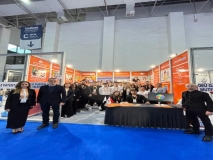
Applied English Translation students at Travel Türkiye Fair in Izmir
The students of the Applied English Translation program at the Vocational School attended the Travel Türkiye Fair held at the İzmir Gaziemir
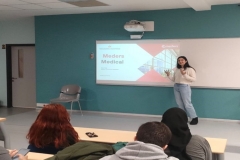
Students Asking Experts Seminar
On November 30, 2023, Thursday, as part of the Practical English Translation Program, Apprentices Ask the Masters Event, Meders Medikal A.Ş hosted
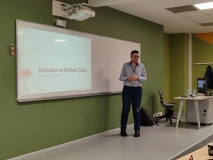
Apprentices Ask Masters" event within the Applied English Translation program
On November 1, 2023, Wednesday, as part of the "Apprentices Ask Masters" event within the Applied English Translation program, we had the
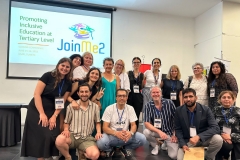
Erasmus+ Internship and Fullbright Information Meeting with MYO Students
On the date of October 20, 2023, an informative meeting was held with the participation of Vocational School (MYO) students. During this
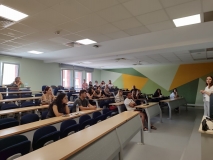
Semester's Kickoff Meeting with Newcomers
The students of the Applied English Translation program have conducted the semester's kickoff meeting. During the meeting, various topics were discussed, including
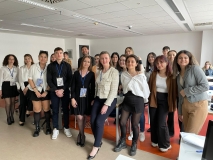
2nd Tourism Days "Crisis Management"
Turizm Günleri (Tourism Days) was held on May 11, 2023, at the Conference Hall of Izmir Economics University. The event was organized



